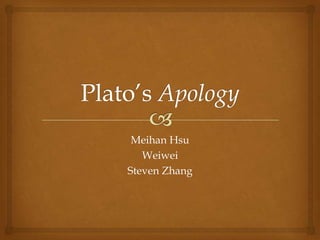
Plato- Apology
- 1. Meihan Hsu Weiwei Steven Zhang
- 2. Author -Plato 427(?) - 348 BCE “Plato” means “the broad” – possibly his nickname. Son of a wealthy Athens family and served in the Athens army during the Peloponnesian War. Plato was Socrates’ student. Almost all we know about Socrates is from Plato’s writings. After Socrates’s execution for corrupting the young and neglecting the gods, Plato left Athens in disgust and travelled widely. In 387 BCE, he returned to Athens and established the Academy which lasted over 900 years.
- 3. Apology The ancient meaning of Apology: Apologia, or speaking in defense of a cause or of one’s beliefs or actions according to Ancient Creek language. Here, it is Plato’s version of the speech given by Socrates as he defend himself in 399 BC against the charges of “corrupting the young and by not believing in the gods in whom the citizens believes.
- 4. The brief summary Socrates is accused because he only speaks the truth and asks the jurors to pay attention to the truth of his words but some of them feel angry about Socrates’s behaviors. Socrates says he is conscious that he isn’t wise although he believe he is smarter than some men. He still keeps his truth through spreading his words over the city. Some accusers blamed him as two reasons: 1) corruption of the young 2) Not believing in the city’s gods but rather in spiritual things. Second charge for Socrates is impiety. Meletus argues that if Socrates denies the consistency of Gods in the spiritual world, he will be impious.
- 5. Continuing Summary Socrates also remains true to his way of life even he may be sentenced to death. During the trial, he also shows people know nothing of death so it is irrational to fear it. When Meletus asks Socrates for the penalty of death, Socrates naturally accepts his fate. Moreover, he also advocates that we should be law-abiding men do justice rather then men with personal emotions. During the final verdict, Socrates closes his defense speech and still remains true to his own ideals. His consistencies of his truth keeps him no fearful and he finally become true himself.
- 6. Character Analysis In the Book Socrates: 70-years-old man on this trial. He has a strong desire to teach most people about his philosophical ideals but he finally sentenced at that time. It is a grave mistake made by jurors and the people. During the trial, his persistence of ideals is respectful and Plato presents him as a martyr. Meletus: An Athenian official and publicly accused Socrates’ ideals. During the trial, Socrates proves Meletus’s mistakes but he still stubbornly refuses to acknowledge and suppressed Socrates.
- 7. Character Analysis in One’s Life Socrates: The protagonist of The Apology Socrates who is less informed by Platonic philosophy and serves more as foil for his interlocutors who claim to have positive knowledge. A very simple man not having many material possessions speaking in a plain, conversational manner
- 8. Character Analysis in One’s life Meletus : The chief accuser of Socrates Responsible for bringing Socrates to trial. Plato's portrayal of him, is sympathetic. Socrates' cross-examination of him in The Apology puts Meletus to shame.
- 9. Important Quotes "I am very conscious that I am not wise at all,” "Either I do not corrupt the young or, if I do, it is unwillingly," "To fear death, gentlemen, is no other than to think oneself wise when one is not, to think one knows what one does not know.” "It is not the purpose of a juryman's office to give justice as a favor to whoever seems good to him, but to judge according to law, and this he has sworn to do.”
- 10. Theme analysis The Apology is bridges to divide between philosophy and literature- less concerned with asserting any particular philosophical doctrines than it is with creating a portrait of the ideal philosopher. Three major themes in Socratic thought: Socratic irony, the elenchus (the Socratic mode of inquiry) the higher ethical concerns that dominate Socrates' life.
- 11. Socratic Irony The Delphic oracle, which proclaimed that Socrates was the wisest of men because he knows that he knows nothing. This oracle has led Socrates to assume his highly ironic stance of confessing his own ignorance, and yet showing his interlocutors to be even more ignorant than he. His wisdom casts all pretensions to human knowledge into question
- 12. The Elenchus Disabuse Socrates' interlocutors of their pretensions and thereby deepens their wisdom. Socrates never lectures on his beliefs in a one-sided manner. This supports the idea that Socrates has no knowledge of his own to put forward. His method of inquiry consists of identifying what his interlocutor thinks he knows, and then slowly dissecting those claims of knowledge. For Socrates, wisdom and virtue are closely connected, so his efforts serve to improve society as a whole. In Socrates' view, if we are all wise, none of us will ever do wrong, and our self- knowledge will lead to healthier, more fulfilling lives. Thus, the philosopher, according to Socrates, does not merely follow abstract intellectual pursuits for the sake of amusement, but is engaged in activities of the highest moral value.
- 13. The Play “The Apology”